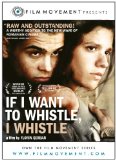| Reviews & Columns |
|
Reviews DVD TV on DVD Blu-ray 4K UHD International DVDs In Theaters Reviews by Studio Video Games Features Collector Series DVDs Easter Egg Database Interviews DVD Talk Radio Feature Articles Columns Anime Talk DVD Savant Horror DVDs The M.O.D. Squad Art House HD Talk Silent DVD
|
DVD Talk Forum |
|
|
| Resources |
|
DVD Price Search Customer Service #'s RCE Info Links |
|
Columns
|
|
|
If I Want to Whistle, I Whistle
In the wake of an impressive resurgence in contemporary Romanian cinema, whose New Wave of recent years has brought us remarkable films like 4 Months, 3 Weeks, and 2 days and Police, Adjective, it might be tempting to ascribe such inspired, accomplished, and unusual work to something in the national culture, some monolithic "Romanian Sensibility," and to anticipate the possibility of equally great things from any other new Romanian films that we might come across. On those terms, Florin Serban's juvenile delinquent drama If I Want to Whistle, I Whistle is a sort of reality check. While far from a bad film, it is an ambitious but faltering début feature, an interesting but flawed and minor work that brings us back down to earth with a sensible reminder of how unrealistic and unfair sweeping generalizations about a national cinema (whether Romanian, French, or American) can be.
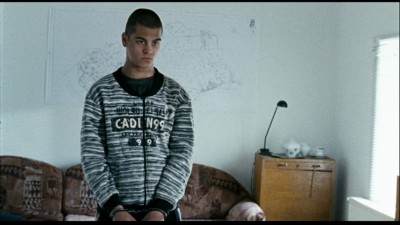
Silviu Chiscan (George Pistereanu) is an 18-year-old inmate of a rural "re-education center" (read: juvenile hall) who has only a couple weeks of his two-year term left to serve. The stakes of getting out, however, have suddenly become much higher for him. For one thing, he receives a visit from his beloved little brother, Marius (Marian Bratu), who informs him that their absentee mother has returned from one of her intermittent boyfriend-chasing voyages to take him off to live in Italy (and away from Silviu). For another, a beautiful girl named Ana (Ada Condeescu), one of a team of sociology students doing "field work" with the boys, catches Silviu's attention, and her unavailability only exacerbates his feeling of social inferiority and makes the bleak, menacing, hierarchical atmosphere of the detention center seem more oppressive and demeaning than ever. Silviu's troubles come to a head, and his unfortunate fate is sealed, when he finally reaches his breaking point, taking Ana hostage in a last desperate attempt to get his mother's attention and keep Marius in his life.
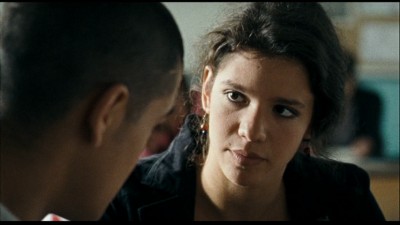
Serban and DP Marius Panduru work in a handheld, quasi-vérité style that is not an entirely successful choice for the story they're trying to tell. It does work to bring a sense of immediacy to certain dramatic encounters and exchanges (for what is probably the film's most powerful scene, in which Silviu and his mother confront each other over her history, the raw look is apt), and it lends an undeniable visual beauty to certain sustained, lyrical moments, especially in some exterior scenes set in the fields surrounding the detention compound. But it also points up the awkwardness of some script elements--a surfeit of event that makes some sequences feel over-crammed and contrived, a jarring arbitrariness to some scenes and actions--that, in this context, strain our credulity. It is as if the Dardenne brothers (L'Enfant, Lorna's Silence) had attempted to remake Rebel Without A Cause, retaining its big gestures and garish emotions but filming it in their signature intimate, quiet, hand-held approach (something those great filmmakers would be too perceptive to do). That earlier, deservedly legendary doomed-delinquent tragedy had the wisdom to treat its melodramatic elements as melodrama. If the unsuccessful bits of If I Want to Whistle, I Whistle prove anything, it is that a story's melodramatic attributes need the right style to thrive; they wither and fade in the glare of a realism evidently chosen more for superficial reasons (trendiness? cheapness? "edginess"? we can only guess) than its suitability to the script.
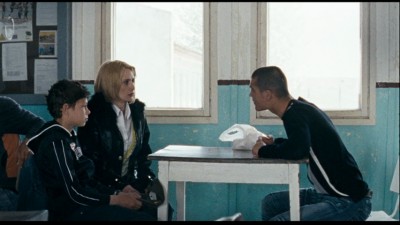
THE DVD:
As noted, the look of If I Want to Whistle, I Whistle is intentionally rough-and-ready; it appears that the film was either shot in 16 mm and blown up or at least shot with this look in mind, leading to an intentional graininess that is part and parcel of the film's aesthetic, which has been carried over well to the DVD. There is some very minor and infrequent flicker to some scenes that appears to be unintentional and could possibly be a transfer glitch.
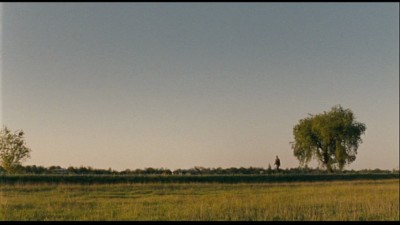
The Dolby digital 2.0 sound is first-rate and more than adequate for what is essentially a modest film, sound-wise. All dialogue, foley sound, and silences are clean and vivid, with nary a pop or crackle.
Extras:The extras on If I want to Whistle, I Whistle are fairly limited, with only the theatrical trailer and very brief onscreen biographies of the director, producer, and two main actors.
As with all Film Movement titles, the disc also includes an unrelated short, Dutch director Joost van Ginkel's Kiss, which depicts a small boy's farewell to his military father, who is set to leave for an unnamed conflict or war "in the desert." A scene of the child shaving his father's head and beard--apparently a regular pre-departure ritual--is crosscut with the child enacting an intense, death-ridden crisis scenario with his toy soldiers, a sort of playing-out of what could happen to his father. The cinematography and all technical aspects are very well done; but, as with many shorts and student films, the idea/story itself is the least developed component, and the film, though intriguing, feels more like a filmmaking exercise that, despite a theme with great potential, has not synthesized the filmmaking and what's being filmed into anything very compelling.
FINAL THOUGHTS:A film whose content, crammed with violent events and emotions, overwhelms its only intermittently effective vérité style, If I Want to Whistle, I Whistle has its strengths; the performances of the main actors (particularly Clara Voda as Silviu's mother), in particular, probably deserved a more considered cinematic approach to the heightened chain of events their characters are involved in. But the work as a whole is shaky in a way that goes well beyond its self-consciously handheld aesthetic. The film is certainly worth a look, but most will not feel the need to have this title sitting alongside the far superior 4 Months, 3 Weeks, and 2 Days in the Romanian New Wave section of their DVD library. It will more than suffice to just Rent It.
|
| Popular Reviews |
| Sponsored Links |
|
|
| Sponsored Links |
|
|
| Release List | Reviews | Shop | Newsletter | Forum | DVD Giveaways | Blu-Ray | Advertise |
|
Copyright 2024 DVDTalk.com All Rights Reserved. Legal Info, Privacy Policy, Terms of Use,
Manage Preferences,
Your Privacy Choices | |||||||









